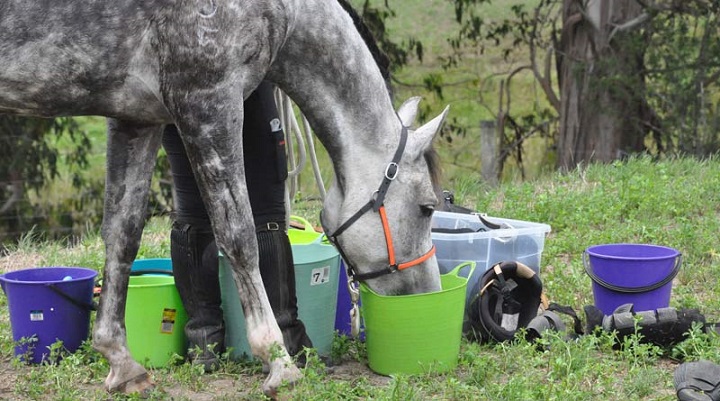Background: Protein vs. Branched Chain Amino Acids:
Many people tend to think of protein as one substance — like one ingredient needed in our horses’ (or our own) diets. But that’s actually not the case.
There are many different types of proteins, each with a specific role to play in the body. Some proteins are structural parts, giving cells their shape or helping them move. Other proteins act as signals, communicating with different cells. Still other proteins aid in metabolism.
However, one thing all proteins have in common is their basic structural parts: amino acids. Each protein is made up of one or more chains of amino acids (known as polypeptides), and there are twenty types of amino acids in all.
Of the nineteen amino acids needed for normal adult bodily function (one is only required in infants), eight are considered essential amino acids. This means they must be consumed in the diet. The remaining eleven are known as non-essential amino acids, which is actually somewhat of a misnomer because they still play essential roles. But since these amino acids are synthesized by the body, they are not essential in the diet.
While good pasture and/or hay usually meet leisure horses’ protein requirements, hard-working horses can often benefit from added protein, specifically in the form of branched chain amino acids (B.C.A.A.’s). Named for their unique chemical structure, the B.C.A.A.’s include three of the essential amino acids: (L-) isoleucine, (L-) leucine, and (L-) valine.
How Branched Chain Amino Acids Work
B.C.A.A.’s work by aiding in the growth and repair of hard-working muscles, as opposed to allowing muscles to use existing protein which can lead to catabolism (muscle break-down). These amino acids increase protein synthesis, which helps to add more muscle. At the same time, B.C.A.A.’s reduce the rate of protein breakdown by decreasing the activity of the protein breakdown pathway and also decreasing the expression of several complexes involved in protein breakdown.
B.C.A.A. Benefits for Exercising Horses:
- Provide support for muscle growth
- May help horses maintain top speed longer
- Support muscle preservation during intense activity
- Support reduced muscle breakdown
- Support recovery after strenuous activity
Supplemental B.C.A.A. Complex from Peak Performance Nutrients
Our B.C.A.A. Complex can be fed daily to improve attitude and aid in muscle growth and recovery. It can also be administered for three days prior to an event to support a more alert, energetic horse and to help your horse maintain top speed for a longer amount of time. The product comes in either powder or convenient paste form.
Whether you have race horses or compete in speed events, three-day eventing, or endurance rides, your horse may very well benefit from receiving additional protein supplementation in the form of B.C.A.A’s.
Sources:
Introduction to Proteins and Amino Acids
BCAAs: The Many Benefits Of Branched-Chain Amino Acid Supplements



